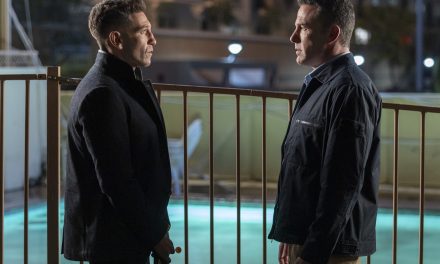Justice should be blind, but in reality, it’s in the eye of the beholder. That’s what Juror #2 wants you to think. We might look at the American justice system as a success story, but there are gaps that allow things through. This is Clint Eastwood’s final movie, and it challenges what you might think about justice. The script from Jonathan A. Abrams tasks audiences with a lengthy stretch of suspension of disbelief. Here’s the basic synopsis from Warner Bros.
Family man Justin Kemp who, while serving as a juror in a high profile murder trial, finds himself struggling with a serious moral dilemma…one he could use to sway the jury verdict and potentially convict – or free – the wrong killer.
The film stars Nicholas Hoult as Justin Kemp, Zoey Deutch as Allison Crewson, his partner, Toni Collette as Faith Killebrew the prosecutor in the case, Chris Messina as Eric Resnick the public defender for James Sythe (played by Gabriel Basso), and also features Cedric Yarbrough, J.K. Simmons, Leslie Bibb, Drew Scheid, Amy Aquino, and Kiefer Sutherland.
You might think this is a standard courtroom drama about a murder case leading into the film, but it ends up taking a bit of a Rashomon-approach with different accounts of the night of the murder. You also have the b-plot of Justin’s wife being pregnant with a somewhat complicated due date and the relationship between prosecutor and public defender on display. It’s all wrapped up in some absolutely anxiety-inducing performances from Hoult, Simmons, and Deutch.

The only issue with Juror #2 is that is takes an absolutely massive amount of twisting and turning as an audience member to justify how this plot actually happens. It’s about as circumstantial and statistically unlikely as it comes. That’s a bit of a nitpick, but it’s something that takes you out of the movie while you’re watching. Justin Kemp is the unluckiest guy in the world on multiple levels.
Outside of that, there are small things that make Juror #2 a bit messy. There are teases of things that are explicitly shown on screen that never end up coming up. It feels like some mistakes were made in editing. There’s one such scene where Justin looks up the legality of certain activities, and the shot hangs on his computer, shutting down with the checkbox for “open window when the computer is turned back on,” and it never comes up again.
The spots where Juror #2 makes you feel like a pit of anxiety are when the film is at its best. Nicholas Hoult plays the morally grey area of this case masterfully, simultaneously being personable and relatable as hell, but also twisting and transforming into a repugnant man. The other jurors in the case, particularly Cedric Yarbrough and Drew Scheid play their parts with humanity and you can totally see them as members of a jury. Yarbrough has the most challenging job in the film, trying to make his material seem not too contrived.
Chris Messina is an underrated weapon in this film as the public defender for James Sythe. He’s the everyman going up against the big-time prosecutor. He could have taken this performance like an Atticus Finch-style lawyer, instead he makes an impassioned plea for a man he truly believes is innocent.

The pacing and unraveling of the narrative are the strongest portions of Juror #2. As it goes on, the story of the night of October 25th comes into view for all to see. You also get to see the fog of justice roll in as preconceived notions fly about both sides of this story. If this is Clint Eastwood’s actual swan song for filmmaking, it’s not an explosive one, but one that’ll make you think about our own humanity and what that means in the eyes of the law.
Juror #2 releases in limited theaters on November 1st.
For more Reviews, make sure to check back to That Hashtag Show.

![Juror #2 – Clint Eastwood’s Swan Song Looks At Justice And Humanity [Review]](https://www.thathashtagshow.com/wp-content/uploads/2024/10/3ac1fb4e-1161-44e6-818f-376d9dcb7de3-1-1280x640.jpg)

![Senpai Is An Otokonoko Ep. 5 “Special”: What Is Love? [Review]](https://www.thathashtagshow.com/wp-content/uploads/2024/08/3056f938-0b45-4e74-9776-6805057336ba-440x264.jpg)

![Attack of the Doc! – Definitely Worth The Watch! [Review]](https://www.thathashtagshow.com/wp-content/uploads/2023/06/355678324_571580415180223_5190420327940425594_n-440x264.jpg)
![The Last Drive-In With Joe Bob Briggs (S4.7) Oh Mother! [Review]](https://www.thathashtagshow.com/wp-content/uploads/2022/06/287869140_1217457142404850_2663573427549364442_n-440x264.png)